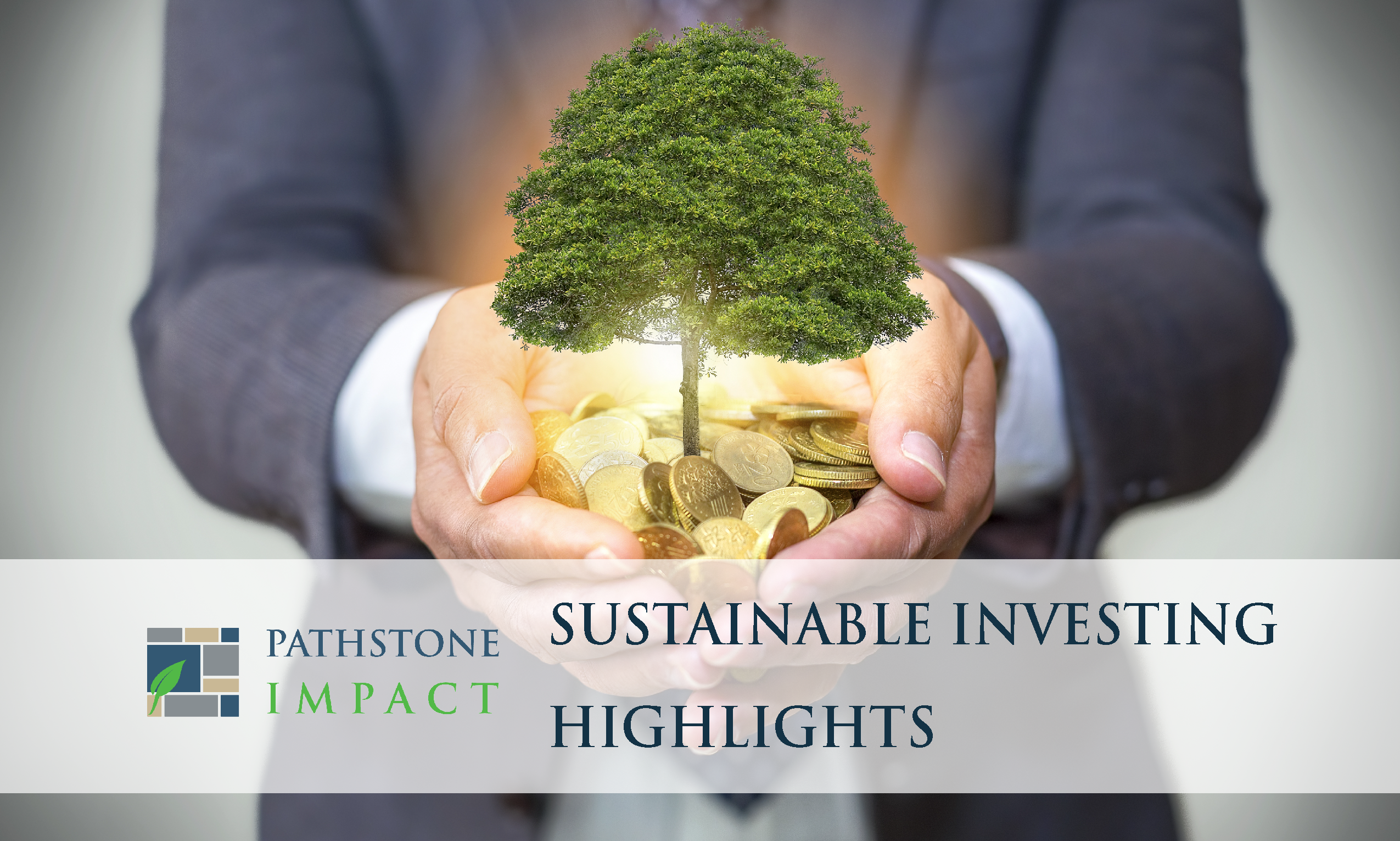DOL Proposes New Rule Regarding ESG
As environmental, social, and governance (“ESG”) becomes mainstream, the Department of Labor (“DOL”) has proposed a new rule aimed at curbing the integration of ESG criteria in Employee Retirement Income Security Act (“ERISA”) plans, citing that ESG funds sacrifice returns. According to Eugene Scalia, United States Secretary of Labor, “Private employer-sponsored retirement plans are not vehicles for furthering social goals or policy objectives that are not in the financial interest of the plan.” The ERISA plan should serve the purpose of providing retirement security for pensioners and not the other way round.
The proposed new rule may serve to restrain 401k fiduciaries from making investments or selecting investment funds based solely on ESG criteria. However, the DOL would consider ESG criteria appropriate in what they perceive as those rare cases where such criteria have economic materiality or provide an economic return when selecting investments.
The DOL proposal comes at a time when ESG funds are gaining recognition from both Wall Street leaders and investors. Jamie Dimon, the CEO of JP Morgan, stated during the 2020 JP Morgan Investors Day that JP Morgan takes ESG seriously because it is the right thing to do, and ESG funds make sense. Larry Fink is another Wall Street leader voicing support for incorporating an ESG lens into an investment process. After the DOL proposed its rule, Fink noted that he believed the proposed rule “accelerates” interest in ESG, by forcing people to clarify that they’re investing in ESG because they’re worried about climate and specific risks.”
The proposed changes were met with a broad wall of opposition. An article by Joyce Blay in Financial Advisor conveyed that almost 96% of 8,636 public comments were opposed to the proposed new rule. Blay noted that, of the 229 comments that were provided by “asset managers, financial advisors, financial service providers, asset owners, pension plans and investment organizations”, 94% were opposed, with only 2% in favor and 4% neutral. The DOL is now asking Registered Investment Advisors for their input in an apparent extension of the feedback period, despite not having requested such input prior to submitting the original proposal.
ESG funds typically evaluate environmental, social, and governance-related risks and opportunities, and a significant number of such funds have delivered strong returns in recent years, compared with peers and with benchmark indexes. A 2019 Principles for Responsible Investment report cited ESG funds’ outperformance over the past decade. Similarly, according to HSBC and RBC analysts, ESG funds outperformed sin stocks due to increased recognition by asset managers that ESG information is material and relevant. As a result of recent outperformance, one might expect the heightened awareness of ESG strategies on Main Street and Wall Street to continue.
In recent years many publicly-traded companies have been encouraged by their investors and other stakeholders to disclose their ESG risk, practices, and impact. The increasing demand for ESG disclosure by investors and stakeholders has led many companies to publish their Corporate Social Responsibility (“CSR”) reports as well as other ESG-related metrics. In an article in Pathstone’s July newsletter, Managing Director and Impact Committee Chair Mark Peters presents an argument as to why ESG integration makes sense. He notes in the article, “An investor seeking to incorporate ESG will be wise to identify exceptional managers that employ a powerful ESG lens, seek to align their portfolio with their values in a thoughtful manner, chart the course in clear terms, and monitor progress relative to clear benchmarks. The revised rule put forward by the DOL just doesn’t ‘get it.’”
Tribute to John Lewis – the Conscience of the U.S. Congress
As Dr. Reverend William J. Barber, II has described, the United States democracy is similar to an imperfect marriage with lots of ups and downs, and yet, it strives each day for a more perfect union. Congressman John Lewis, who represented the Georgia 5th congressional district in the United States House of Representative, is one of many leaders whose leadership and voice have helped to keep the American marriage together with the hope of a perfect union. Congressman Lewis was 80 years old when he passed away on July 17, 2020, from stage four pancreatic cancer. Until his death, Lewis, who served his congregational district for three decades, was the conscience of the United States Congress, one who got into good trouble by speaking truth to power.
There is a lot to learn from Lewis’ legacy. Lewis was born in Alabama to sharecropper parents, and as a young man, he played an influential role in the passage of the Voting Rights Act of 1965. Prior to the passage of the Voting Rights Act, Lewis took 600 men and women to protest against unequal voting rights. During the protest, “Lewis was the first to be beaten in the clash with state troopers, who cracked his skull with a billy club on the date that became known as ‘Bloody Sunday.’ The televised images of the bravery shown by Lewis and other protesters in the face of state violence inspired the passage of the 1965 Voting Rights Act just two months later.”
Congressman Lewis’ legacy could help all Americans strive for a perfect union. Up until his last breath, Lewis still believed in the America he loved. A letter by Lewis entitled “Together, You Can Redeem the Soul of Our Nation,” published on the day of his funeral, reads, “while my time here has now come to an end, I want you to know that in the last days and hours of my life you inspired me. You filled me with hope about the next chapter of the great American story when you used your power to make a difference in our society. Millions of people motivated simply by human compassion laid down the burdens of division. Around the country and the world, you set aside race, class, age, language, and nationality to demand respect for human dignity […], Democracy is not a state. It is an act, and each generation must do its part to help build what we called the Beloved Community, a nation and world society at peace with itself. When historians pick up their pens to write the story of the 21st century, let them say that it was your generation who laid down the heavy burdens of hate at last and that peace finally triumphed over violence, aggression, and war. So I say to you, walk with the wind, brothers, and sisters, and let the spirit of peace and the power of everlasting love to be your guide.”
Corporate Governance and the Disgraced Wirecard
Corporate Governance, the “G” in ESG, is a material factor to be considered when assessing a potential investment. Management misconduct can have a serious negative impact on a company’s market value. Recently this was demonstrated by the accounting fraud and subsequent bankruptcy of Wirecard AG.
A former rival of Square Inc. and Paypal Holdings, the German payment-processing company Wirecard recently revealed that 1.9 billion euros it supposedly held in two Philippine banks probably never existed. The company took a nosedive on its market value and had to file for insolvency a week later. German authorities have placed Markus Braun, Wirecard’s former CEO, and other executives under arrest on claims that they “knew at least by the end of 2015 that the Wirecard Group was losing money.” Wirecard’s senior management was accused of conspiring in fraud of around 3.2 billion euros, borrowed from banks in Germany and Japan.
Questions regarding Wirecard’s corporate practices were first raised internally by a whistleblower in early 2019. The Financial Times reported the claim that the company had backdated transactions to boost revenues. Under the leadership of Markus Braun, then CEO, Wirecard hired a law firm in Singapore to investigate the situation.
Although the company claimed that the investigation found no wrongdoing on its part, it never published the full report. Investors urged the company to evaluate the situation more thoroughly, and Braun agreed by inviting KPMG to conduct an independent audit. When the audit concluded in April this year, it again raised doubts about the authenticity of Wirecard’s revenues and cash flows. Despite the concerns and doubts Braun and many other top executives at the company defended its accounting practices throughout the process.
Corporate ethics have always been extremely important in the eyes of the market since investors make decisions assuming that companies are honest and upfront about their operations. Wirecard is just a recent example of a company that has suffered financially due to management fraud and dishonesty. Wells Fargo’s stock price and brand reputation took a hit for fraudulently opening accounts in customers’ names in order to boost their fee revenue. Despite the fact that it survived the 2008 financial crisis better than its peers, Wells Fargo lost its position as the most valued American bank to its main rival, JPMorgan Chase.
Volkswagen’s diesel-gate fraud is another clear example of how bad corporate ethics can directly affect a company’s reputation and revenue stream. Volkswagen had to spend around 6.7 billion euros as a result of their fraud. In late 2015 this fraudulent activity resulted in the company posting its first quarterly loss in more than 15 years.
Air Pollution and Premature Birth
Across the globe, air pollution has been linked to major health-related problems. Approximately 4.2 million premature deaths are linked to ambient air pollution, mainly from stroke, heart disease, lung cancer, chronic obstructive pulmonary disease, acute respiratory infections in children, and premature birth.
According to the United Nations Children’s Fund (“UNICEF”), “nearly 30 million babies are born too soon, too small or become sick every year and need specialized care to survive.” Since the 1980s, addressing the root causes of the premature birth rate has been of great interest to policymakers and researchers in the medical field. Two recent studies provided sharp insights into how air pollution is to some extent linked to premature birth, and how the lockdown, with improved air quality and less work-related stresses on expectant mothers, may have led to a reduction in the number of premature babies.
A new study carried out by a group of medical researchers from the Keck School of Medicine of the University of Southern California “found that among mothers living within five kilometers (or about three miles) of a high amount of flaring activity during pregnancy, we saw 50 percent higher odds of preterm birth compared to mothers that had no exposure to flaring.” Past studies had demonstrated that those residing near oil and gas wells have increased chances of adverse birth outcomes; however, recent research from Keck School of Medicine is the first to take a closer look at gas flaring.
Another research study on the impact of air pollution on premature babies found that the rate of premature baby birth had fallen by 90% since the lockdown of 2020 began. According to the study, “during the lockdown in Denmark and Ireland, the number of premature babies born declined by nearly 90 percent, researchers there found.” A full understanding of the causes of premature birth has been elusive for decades, and ways to prevent preterm births have been largely unsuccessful. If confirmed that the lockdown did help reduce premature baby birth, researchers might see it as a natural experiment that offers insights into the causes of premature birth.
Please see the PDF version of this article to read more
Please see the PDF version of this article for citations and important disclosures.







